Tesla to open Shanghai plant with capacity of 500,000 cars a year

Tesla’s North American assembly lines are humming at last but the electric vehicle company’s plans for Asia dwarves its current operations.
Reuters quotes local Chinese media on Tuesday as saying the Californian company has signed agreements with Shanghai authorities that will allow it to open a plant in the Chinese city with an annual capacity of 500,000 cars:
The Shanghai government made the announcement on its official WeChat account which showed a picture of Tesla Chief Executive Elon Musk shaking hands with Shanghai Mayor Ying Yong.
A factory in China would help the carmaker avoid import tariffs imposed by Beijing in the latest salvo of its trade spat with the US.
Tesla will consume roughly 16,000 tonnes lithium, 1,500 tonnes cobalt, 25,000 tonnes graphite anode and 17,500 tonnes of nickel in 2018.
Tesla announced Tuesday it has hiked prices on its Model X and S cars by about 20% in China, the first US automaker to do so. The cheapest Tesla (Model S 75D) now costs just less than $150,000 after the hike. Bloomberg quotes a Tesla spokesperson as saying the first vehicles built in Shanghai could leave the factory in two years time.
Tesla said in November it is likely to manufacture the Model 3 sedan and upcoming Model Y crossover in China rather than its pricier models.
Tesla hit a production record during the second quarter with more than 53,000 cars rolling off assembly line over the three months to end June. A year ago the company produced 25,700 during the same quarter.
Benchmark Mineral Intelligence, a battery materials tracker, estimates that Tesla and its alliance partner Panasonic will increase battery consumption by 61% this year.
The Tesla gigafactory in Nevada together with its Japanese plant will consume roughly 16,000 tonnes lithium (hydroxide), 1,500 tonnes cobalt, 25,000 tonnes graphite anode and 17,500 tonnes of nickel according to Benchmark research in 2018.
China paves way for EVs
China is already the top manufacturer of electric vehicles and the batteries that power them and is set to increase its share of the global market in coming years. Sales of EVs in China is projected to top 1 million this year for the first time, up nearly 30% from 2017. Tesla sold fewer than 15,000 cars in China last year according to a Bloomberg report.
AlixPartners, a US consulting firm, The AlixPartners study sees an eye-popping $255 billion pouring into research and development and capital expenditures to bring some 207 electric models to the market by 2022. A further $61 billion has been earmarked for autonomous-vehicle technologies according to the study.
AlixPartners forecasts the Chinese vehicle market will grow to 29.1m units this year, on its way to 38.2m in 2025 (equal to 52% of global volume growth over that period). By 2030, 40% of vehicle sales in the region will be EVs.
The European car market is likely to expand by 2.5m units by 2030 to reach 23.1m units annually with a roughly 30% penetration of EVs by that time. The US will lag and only 16-21% or 2.6m–3.5m of sales in 2030 is likely to be electric.
NOW READ:
Automakers spending $255B on EVs a ‘pile-up of epic proportions’
More News
Contract worker dies at Rio Tinto mine in Guinea
Last August, a contract worker died in an incident at the same mine.
February 15, 2026 | 09:20 am
{{ commodity.name }}
{{ post.title }}
{{ post.date }}





Comments